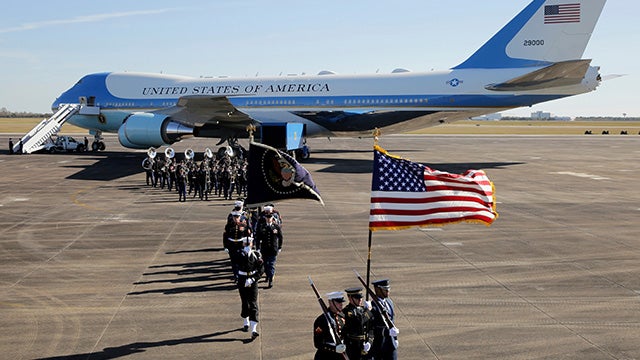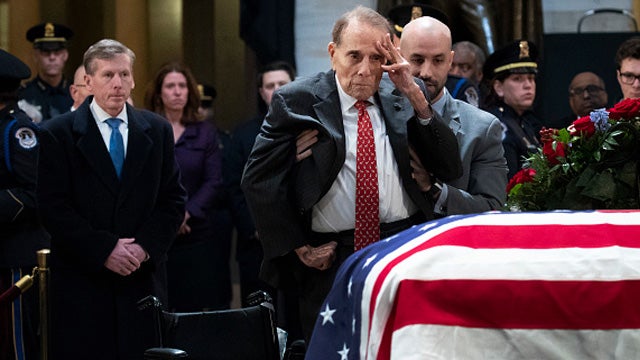RUSH: Ladies and gentlemen, I just saw something that you are gonna see later on TV, and I want to try to help you understand its importance. I took a little break here at the top of the hour and got back down in the chair about 90 seconds before the program beginning, and the minute I walked back in and checked TV, I saw Bob Dole being helped up out of his wheelchair to pay respects to George H. W. Bush.
The casket was where it is in the rotunda and they had steered Bob Dole’s wheelchair as close to the rope line as possible, and he insisted on standing up. He can’t stand. It is impossible. What people don’t know is that Bush and Dole had an incredible rivalry — and at one time in their lives, there was real serious acrimony. It was a political rival. It wasn’t personal. Bush was chairman of the RNC at some point, and it involved the presidential nomination, presidential politics.
Despite all that we’re hearing about civility and sophistication, the rivalry between Bob Dole and George Bush for primacy in the Republican Party when it happened was as deep and filled with rancor as most any rivalry you’ve ever heard of. It didn’t get a lot of notice, however. But for people who knew, it was a serious one, and there was no love lost between the two. For many years Dole believed that things that… I use the word “entitled.” I don’t mean it in a sense it’s undeserved.
The things that Bob Dole thought he had worked for and had earned, he routinely saw Bush get, and he saw himself be undercut. While I say it’s not personal, some of it was, but it was all about their lives and politics. It wasn’t rivalry born of, you know, personal acrimony having to do with things outside politics. But for Bob Dole to show up and… He demanded his aide pick him up, and his aide was propping him up by the armpits. He was literally hugging him and holding him up, and Bob Dole could not stand.
It was the most incredible thing. He insisted on it. He insisted on standing. He insisted, no matter that he couldn’t do it. He demanded. Even when he began to fall back, you could see him shake his head and tell his aide, “No.” They propped him up, and it appeared he was gonna stand on his own for whatever split second of time he could to honor George H. W. Bush. It didn’t take long and he was back in the wheelchair — and you could see that it took everything he had to do this. I know both of these people, and they do come from…
You know, the media’s getting some things half right today, but for the wrong reasons, the wrong motivations. But a lot of things they’re saying about George H. W. Bush do happen to be true, in terms of his class and his statesman-like carriage. When they call him a “patrician,” they mean it as an insult. They mean born to wealth. But he genuinely was a well-mannered, decent person who did not see other people down the bridge of his nose.
 The word “patrician” is meant to imply that he looked down on people, thought he was better than others by virtue of genealogy, birth. He was not that. Bob Dole didn’t come from anywhere near the background George H. W. Bush did. Bob Dole came from Kansas. Bob Dole was injured in World War II, but was never treated as the conquering hero that George H. W. Bush was. Bob Dole lost the ability to write and to use his right arm in a war injury. George H. W. Bush lost nothing when he was shot down. He was rescuing and saved.
The word “patrician” is meant to imply that he looked down on people, thought he was better than others by virtue of genealogy, birth. He was not that. Bob Dole didn’t come from anywhere near the background George H. W. Bush did. Bob Dole came from Kansas. Bob Dole was injured in World War II, but was never treated as the conquering hero that George H. W. Bush was. Bob Dole lost the ability to write and to use his right arm in a war injury. George H. W. Bush lost nothing when he was shot down. He was rescuing and saved.
It was these kinds of things that made up the rivalry. But throughout it all, there was a mutual respect. I remember doing the TV show. It was sometime between 1992 and ’96. I don’t remember the exact year. But Bush was somewhere, and something happened to cause him to do a tribute to Bob Dole. Bob Dole was not there. Somebody had asked him a question about Bob Dole or Bob Dole had done something in the news, and Bush stopped what he was doing and gave the greatest tribute to somebody that you could possibly hear.
He talked about his heroism, his patriotism, his devotion to decency and goodness. Again, people didn’t realize how deep this rivalry went. I just saw Ed Rollins talking about it; he was even glossing over it. He said it had to do with the RNC. It was much deeper than that. But the testament to the character of both is what Bob Dole did today. Had the situation been reversed, circumstances been reversed, George H. W. Bush would have been at Bob Dole’s casket and attempted the same effort to honor and say good-bye.
It was really a touching thing if you know how deep the rivalry was between these people, and Dole felt like he was getting the short end of the stick on virtually every comparison that was made between the two of them. And, you know, Dole ran for president after Bush did. Dole ran in 1996 against Clinton, and that was largely a nomination… Republicans knew that Clinton was gonna get reelected. Nobody really thought Clinton could be defeated. So it began this…
It didn’t actually begin it. The Democrats began it. But it began this tradition of honoring a lifelong, valued, devoted Republicans, letting him have the nomination when you know they’re gonna lose. The Democrats did that for Walter Mondull in 1984 when they knew that Reagan was gonna win reelection. Mondull had been a loyal warrior. So let him be the nominee, let him go out and have relationships with fundraisers and get some money and this kind of thing.
But he was gonna lose, and the same thing with Bob Dole in 1996. You know who was campaigning with him the last two weeks, side by side? George H. W. Bush. They both called this program about a week before the election in 1996. They were on the road, and they both called here and they both said, “There’s something happening out here, Rush.” That’s what people destined to lose always say. Trump said it at his rallies toward the end of the week. “There’s something happenin’! There’s something happenin’!”

He would tell anybody who’d listen, “There’s something happening out here,” and sometimes you think there is. You see big crowds at a rally, any kind of external evidence that maybe the polls are wrong. “Maybe it’s not gonna be as bad as we think. Something’s happening out here.” But they both called together on a conference call, same phone line, and it was a touching moment. But to watch Bob Dole, who cannot stand… I can’t emphasize that enough: He cannot stand up. He is forever relegated to his wheelchair.
He insisted on it. You could tell that his aide didn’t want to try. You could tell that the aide was mightily uncomfortable. It did not look like anything other than what it was: Impossible. And even after the aide got Bob Dole out of his wheelchair and he was standing, he couldn’t… He can’t feel his legs. He began to topple immediately, even being held on to. But he insisted on it. He insisted on showing up. You could see the determination on his face, and you could see the sense of accomplishment when he was back in his wheelchair.
It was really touching. It was really something to see. I hope somebody on cable news replaying this today knows something of the backstory to make this little incident today what it’s worth. I hope somebody can explain why it’s important to people watching it. This is not just some elderly Republican senator showing up to honor a fallen Republican president because that’s what you do. This was deeply personal.
It was a sign of the respect they both had for one another after all of the wars and after all of the battles were over and they had been spent and there was no more any need for the rivalry. It was a mutual respect relationship, and Dole personified it today. But the kind of determination that he showed and the kind of commitment that he showed — the look on his face — he was utterly defiant of the impossible, in getting out of his wheelchair today to honor George H. W. Bush.


